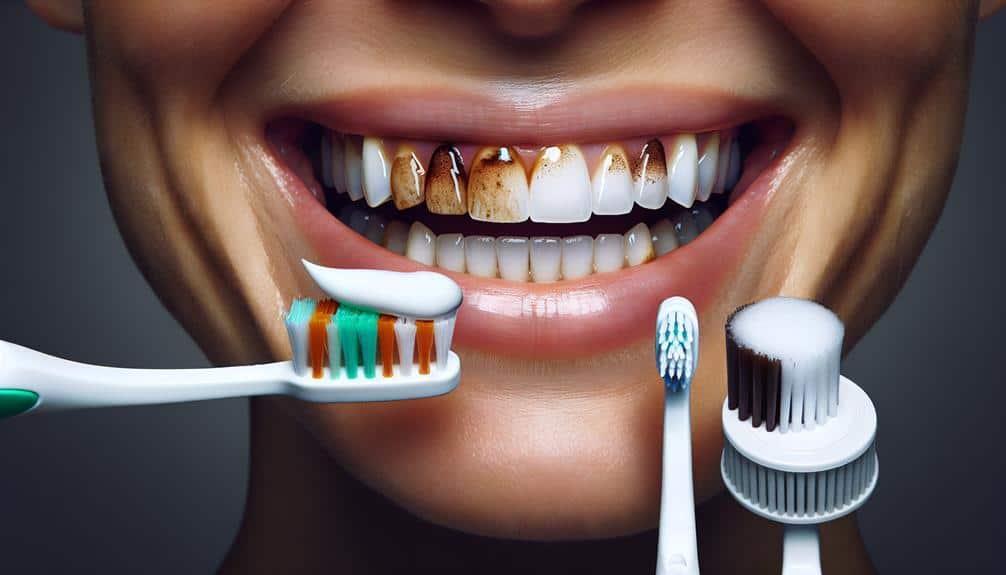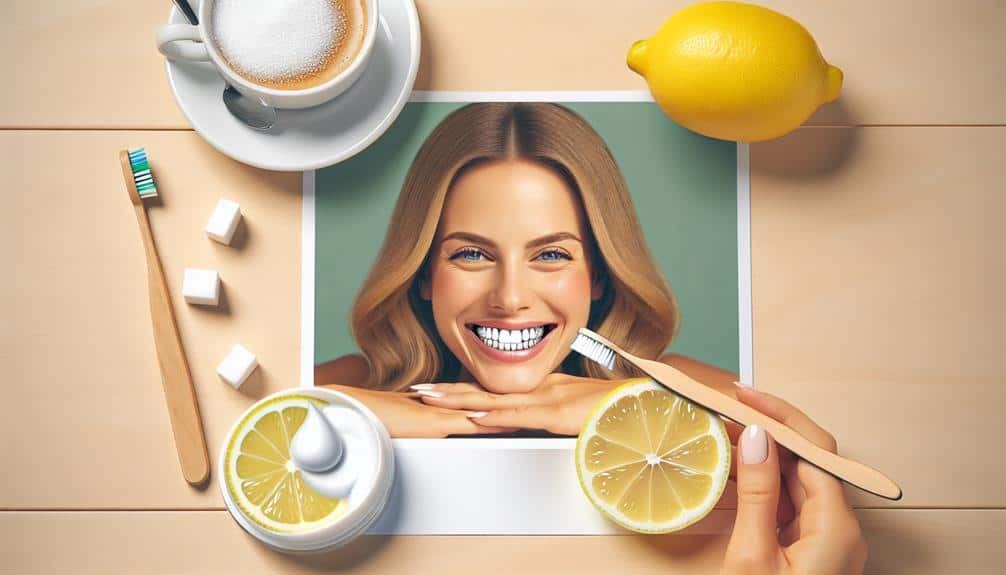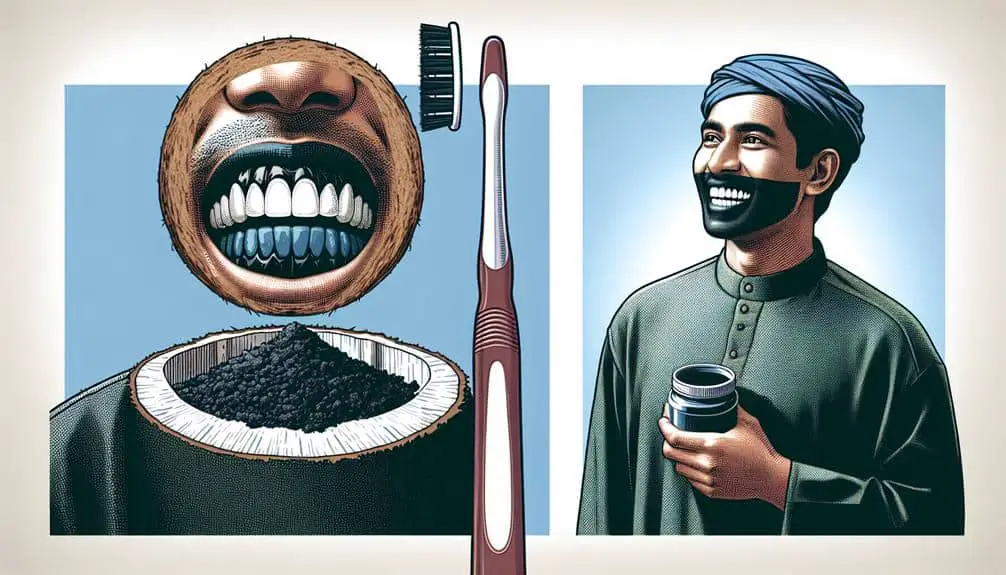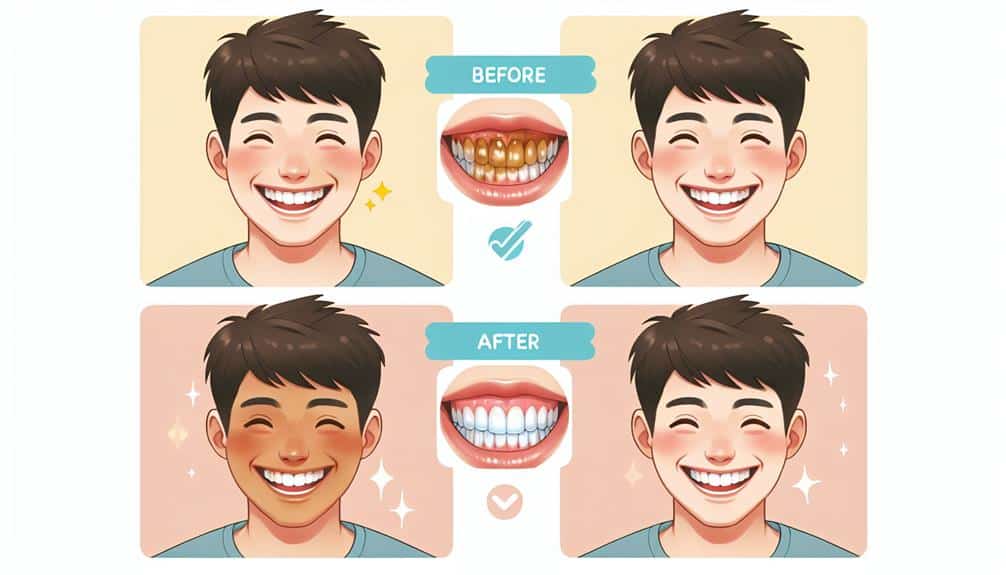To remove coffee stains on your teeth, try proper brushing techniques with a soft toothbrush. Brush thoroughly for two minutes, twice daily. Floss using the C-shape method and consider whitening strips or mouthwash. Use coconut oil for oil pulling and activated charcoal for natural whitening. Consult a dentist for professional treatments like laser therapy or veneers. Make lifestyle changes like limiting coffee intake and eating enamel-strengthening foods. Try DIY methods using fruit peels, baking soda paste, or diluted hydrogen peroxide. These approaches can help you achieve a brighter smile.
Key Points
- Brush teeth with a soft-bristled toothbrush and whitening toothpaste.
- Consider professional whitening treatments like laser therapy.
- Use natural remedies such as oil pulling and activated charcoal.
- Limit coffee intake and use a straw to minimize staining.
- Incorporate DIY treatments like baking soda paste and fruit peels cautiously.
Brushing Techniques for Coffee Stains
To effectively remove coffee stains on your teeth, utilize proper brushing techniques recommended by dental professionals. Start by using gentle brushing motions with a soft-bristled toothbrush to prevent enamel damage while effectively removing surface stains. Make sure you brush all surfaces of your teeth, including hard-to-reach areas, for at least two minutes twice a day. Incorporate flossing into your daily routine to remove plaque and stains from between your teeth where your toothbrush can't reach. Flossing techniques such as the C-shape method can help dislodge coffee particles and prevent further staining.
Consider using whitening strips as an additional method to combat coffee stains. These strips contain bleaching agents that can lighten stains and improve the overall color of your teeth. However, it's essential to follow the instructions carefully to avoid damaging your enamel. Mouthwash can also be beneficial in reducing stains by reaching areas that brushing and flossing may miss. Opt for a whitening mouthwash to help maintain a brighter smile and combat coffee stains effectively.
Natural Remedies for Whiter Teeth
For naturally whiter teeth, incorporating certain home remedies can help enhance the brightness of your smile. Oil pulling is a traditional method that involves swishing oil around in your mouth to remove bacteria and promote oral health. Coconut oil is commonly used for oil pulling due to its antibacterial properties. To try this method, swish a tablespoon of coconut oil in your mouth for about 15-20 minutes, then spit it out and rinse your mouth thoroughly.
Another natural remedy gaining popularity is activated charcoal. Activated charcoal has adsorbent properties that can help remove stains and toxins from the teeth. You can make a paste by mixing activated charcoal powder with water and gently brushing your teeth with it for a couple of minutes. Remember to rinse your mouth well after using activated charcoal to prevent any residues.
These natural remedies can be incorporated into your oral care routine to help maintain a brighter smile. Remember that consistency is key when using natural methods for teeth whitening.
Professional Whitening Options Available
When considering professional whitening options for your teeth, consulting with a dental professional is vital to determine the most appropriate treatment for your specific needs. Two common professional whitening methods are laser treatment and dental veneers.
Laser treatment involves the use of a laser to target and break down stains on the teeth, resulting in a brighter smile. This procedure is typically quick, effective, and can lighten teeth several shades in just one session.
On the other hand, dental veneers are thin shells made of porcelain or composite resin that are bonded to the front surface of your teeth to improve their appearance. Veneers can effectively cover up coffee stains and provide a long-lasting solution for achieving a whiter smile.
However, both laser treatment and dental veneers should be performed by qualified professionals to guarantee safety and best results. Before undergoing any professional whitening procedure, it's essential to discuss your goals and expectations with your dentist to determine the most suitable option for you.
Lifestyle Changes to Prevent Stains
Wondering how you can make simple lifestyle changes to prevent coffee stains on your teeth? Preventive habits play a significant role in maintaining a bright smile. To prevent coffee stains, consider implementing a few key lifestyle changes.
To begin with, be mindful of your coffee consumption. Limiting the frequency and quantity of coffee you drink can help reduce the likelihood of stains forming on your teeth. Additionally, consider using a straw when drinking coffee to minimize direct contact with your teeth.
Dietary changes can also aid in preventing coffee stains. Consuming crunchy fruits and vegetables like apples, carrots, and celery can help scrub away surface stains on your teeth. These foods can also increase saliva production, which naturally cleanses the teeth and helps prevent staining. Moreover, incorporating more dairy products into your diet can strengthen tooth enamel, making it more resistant to stains.
DIY Whitening Treatments at Home
To effectively brighten your smile at home, consider trying do-it-yourself whitening treatments using safe and proven methods. There are several DIY methods you can incorporate into your oral care routine to help reduce coffee stains on your teeth:
- Fruit Peels: Rubbing the inside of banana peels or orange peels on your teeth can help whiten them naturally. The peels contain minerals such as potassium, magnesium, and manganese, which can aid in brightening your teeth.
- Baking Soda: Baking soda has natural whitening properties and can gently scrub away surface stains on your teeth. You can create a paste by mixing baking soda with a small amount of water and brushing your teeth with it a few times a week.
- Hydrogen Peroxide: Diluted hydrogen peroxide can be used as a mouthwash to help whiten teeth. It has bleaching properties that can aid in removing stains when used in moderation.
Incorporating these DIY whitening treatments into your dental care routine can help maintain a brighter smile at home. Remember to use these methods cautiously and consult with your dentist if you have any concerns.
Frequently Asked Questions
Can Coffee Stains on Teeth Lead to More Serious Dental Issues if Left Untreated?
If left untreated, coffee stains on teeth can impact dental health greatly. Studies show that neglected stains can lead to serious consequences like enamel erosion and gum disease. Regular dental cleanings help prevent these issues.
Is There a Specific Type of Toothpaste That Is More Effective at Removing Coffee Stains?
When comparing toothpaste for removing coffee stains, look for ones with whitening properties like baking soda or hydrogen peroxide. These ingredients can be effective. Prevention can include regular brushing, flossing, and home remedies like baking soda paste.
How Long Does It Typically Take to See Noticeable Results From Professional Whitening Treatments?
Typically, professional whitening treatments can show noticeable results after just one session, with full effects visible within a few sessions. The duration varies based on the treatment method and individual factors, but effectiveness is generally high.
Are There Any Foods or Drinks That Can Help Prevent Coffee Stains From Forming on Teeth?
To prevent coffee stains, incorporate natural remedies and dietary changes. Foods like apples, celery, and carrots promote saliva production, which helps neutralize acids and remove stains. Drinking water after coffee can also rinse away pigments.
Are There Any Potential Side Effects or Risks Associated With DIY Whitening Treatments at Home?
When contemplating DIY whitening treatments at home, it's important to be aware of potential risks and side effects. Safety concerns may include heightened tooth sensitivity, gum irritation, and possible damage to enamel. Consult a dental professional for guidance.



